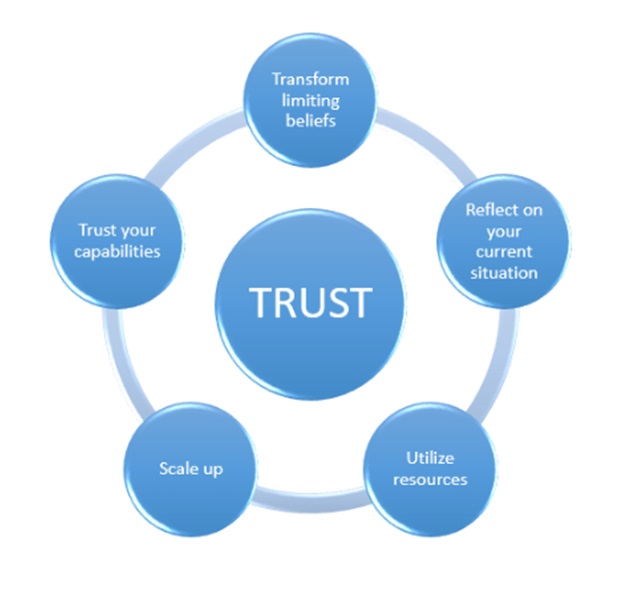A Coaching Model Created by Sara Janiczek
(Relationship Coach, GERMANY)
T.R.U.S.T is a coaching model that helps to create a framework in the coaching process. It is a structured way of guiding the client to their desired outcome. My coaching model is based on trust because trust is essential in life. If you cannot trust something then life becomes more difficult. Especially if you cannot trust yourself. Using this coaching model, I want to support my client through a transformational process.
Transform Limiting Beliefs
The quality of your thoughts determine the quality of your life – A. R Bernard
People’s thoughts create certain behaviors, this in turn creates their reality. If a person is not satisfied in their life, then new thoughts need to be installed and old habitual thoughts deleted. I would start a coaching process by looking at what it is that my client believes to be true about the life they live and whether any beliefs are not serving them.
Possible Coaching Questions:
- How is this belief serving you?
- What is this belief costing you?
- Where does this belief come from?
- If you don’t change this belief, how will your life look like 20 years from now?
- Who would you be without that belief?
- What will you lose when you get what you want?
- What beliefs are stopping you from deciding for yourself?
As homework for the next session, I would invite the client to write down their new empowering beliefs about themselves, the world, others, and their abilities. During the next session, we could explore a visualization practice where the client imagines living according to their new beliefs and visualize how their lives would change.
Reflect on your current situation
Reflection is an important aspect of a fulfilled life. We tend to want to distract ourselves from uncomfortable feelings. Contradictory to casual thinking, a reflective state of mind
requires a conscious effort to think about events and develop insights into them. It is closely linked to the concept of learning from experience, in which you think about what you did, and what happened, and then decide what you would do differently next time.
Possible Coaching Questions:
- What benefits do you get from your current situation?
- What does staying in this current situation cost you?
- What kind of new responsibilities will you have, that you don’t want?
- How did you behave? What thoughts did you have? How did it make you feel?
- Were there other factors that influenced the situation? What have you learned from the experience?
- Is there anything you could do or say now to change the outcome? What action(s) can you take to change similar reactions in the future? What behaviors might you try out?
Utilize Resources
At this stage in the coaching process, it would be time to think about options the client has, to help them achieve their objective.
Possible Coaching Questions:
- What recourses do you need to achieve your objective?
- Who could help you?
- What are your options? Let’s shoot for at least five potential solutions.
- What have you seen others do that might work for you?
- What have you done in similar situations in the past?
- Which of these options will most effectively move you towards your goal?
Scale-up
After the exploration of recourses, it might be effective to try to expand the client’s thinking to scale up their life.
Possible Coaching Questions:
- If you had unlimited resources and couldn’t fail, what would you set out to do?
- What would that dream look like if you used your full capacity?
- Visualize yourself at a time in the future when you are living your ideal life. How would that look?
- What kind of lifestyle have you dreamed of in the past that you’ve laid aside?
In the end, we could explore a plan for practical implantation of the new awareness. What changes could they make today? In the upcoming weeks or months? What support do they need? What accountability do they want?
Trust your capabilities
We all have the choice to either belief in ourselves or allow ourselves to be sucked into self-pity and feelings of self-doubt. Through the exploration of ways the client can trust their capabilities, we might be able to achieve a breakthrough and a solid ground for change. This could strengthen their commitment towards their new set goals.
Possible Coaching Questions:
- In what ways are you trusting yourself?
- How do you know that you can trust your capabilities?
- What do you know already about what you were made to do?
- If you dreamed in terms of your potential instead of your current capabilities, how would it change this dream?
This marks the last step of the coaching process. I would invite the client to create a list of accomplishments that they will fill out as soon as they notice a new achievement. Seeing the list daily will strengthen their trust in their capabilities. Whether the change will be created is up to the client’s commitment level and their ability to create an effective structure. As a coach, I can further encourage and serve as an accountability partner. In upcoming sessions, I would discuss the progress, setbacks, and ideas for improvement with the client.
Resources:
“What is reflective practice?“ Web.https://www.skillsyouneed.com/ps/reflective-practice.html
Stoltz’s Tony – Coaching Questions. A coach’s guide to powerful asking skills. 2008

